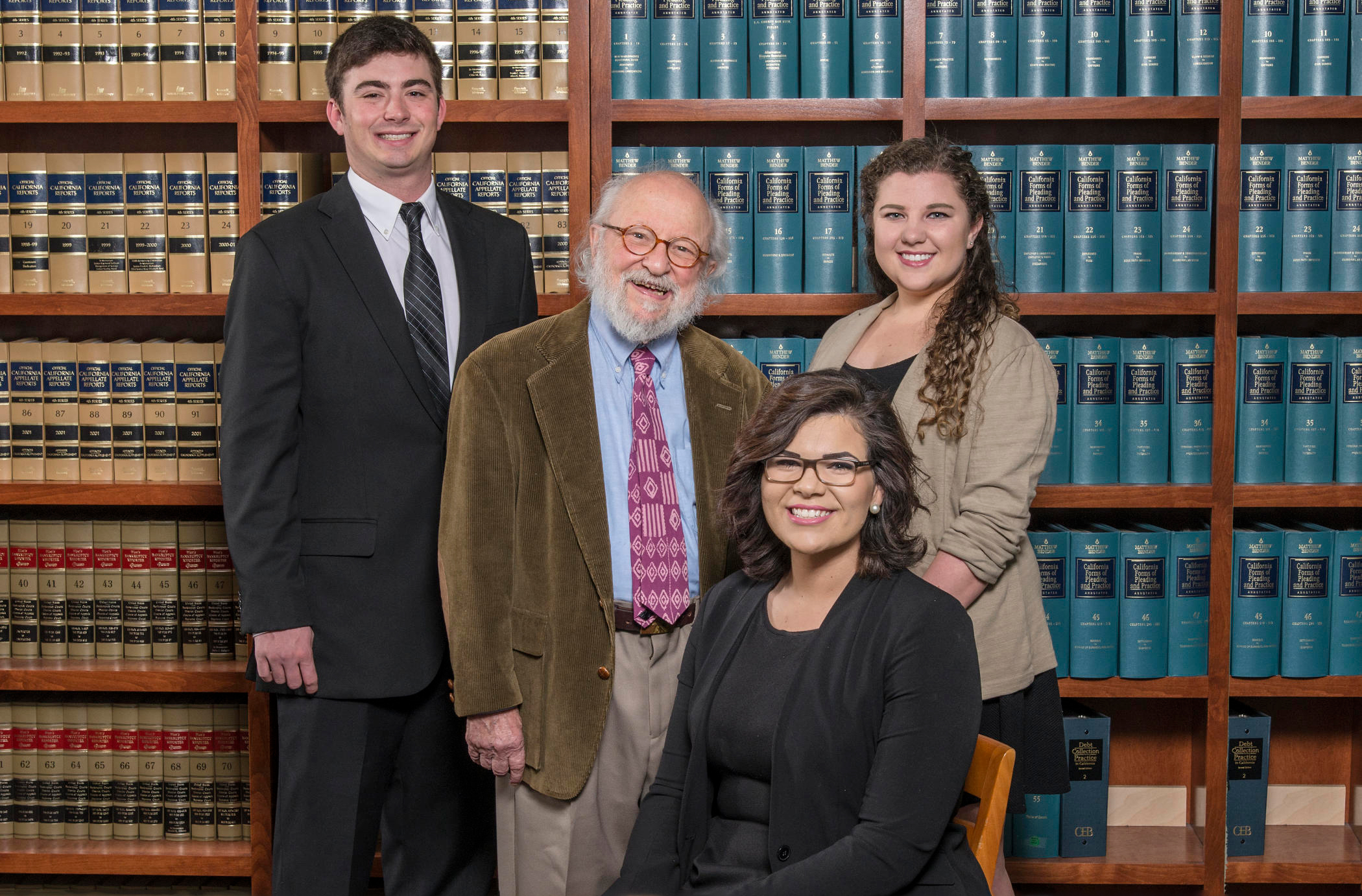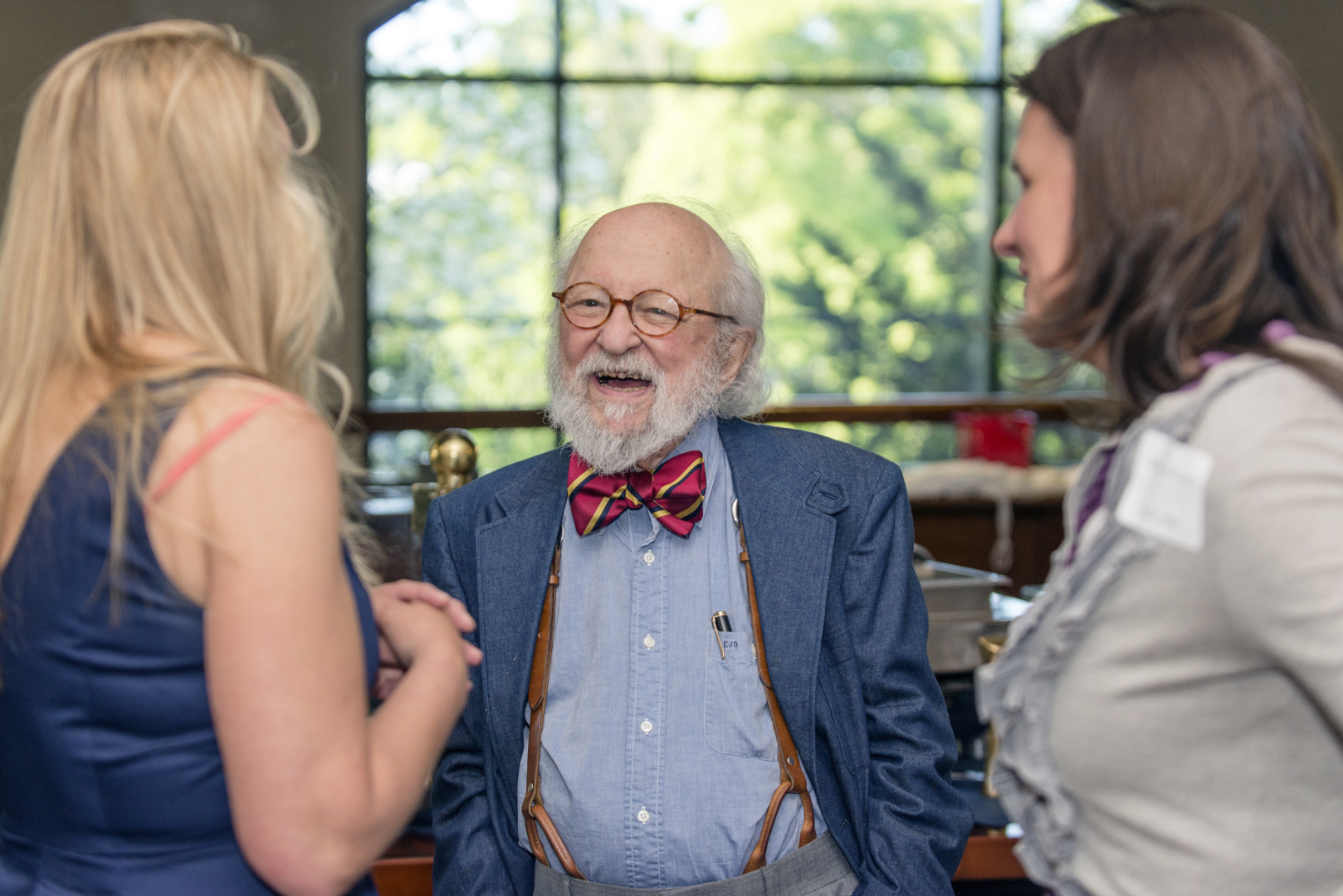Fond Farewell: Political Science Professor Emeritus and CLIC Founder Ed Bronson

Professor Emeritus Ed Bronson, who taught political science and criminal justice for more than 30 years and founded the Community Legal Information Clinic (CLIC), passed away April 25. He was 91.
Born May 10, 1930, in Chicago, he served in the Utah National Guard, the Air Force, and the Virginia National Guard from 1948–55. He then completed his undergraduate and law degrees at the University of Denver, and a Master of Law from New York University. He later earned a PhD in political science from the University of Colorado, Boulder, at which point he realized teaching was what truly inspired him.
Bronson was hired at Chico State in 1969 as a faculty member in the Department of Political Science. That same year, he created CLIC, which was the first university-based legal clinic operated by undergraduate students and today remains the country’s largest, most comprehensive, and longest-running clinic of its kind. CLIC has engaged at least 3,500 student interns in the last five decades, and its students average more than 8,350 hours of public service per year in providing information and referrals.
Bronson was motivated to found CLIC by the glaring lack of legal representation in the community—particularly for low-income or underserved populations. His vision was to bridge the gap with a free legal assistance clinic operated by political science majors and supervised by expert faculty and local attorneys.
“Ed’s philosophy was bringing access to justice and the courts to all individuals, and to instill in all of our students a sense of justice and community service,” said CLIC Supervising Attorney Sally Anderson (Political Science, ’94), noting that alumni have gone to work as attorneys, judges, and members of the legislature, and others have started their own legal nonprofits.
“For so many of his students, he changed the trajectory of what they thought they wanted to do,” she continued. “I think a lot of them got into law with a priority of making a lot of money and that priority shifted to duty to their community and appreciating the ability to help those that are less fortunate and in need.”
Anderson credits Bronson for her own passion for civil rights and civil liberties, and said he gave her the confidence as a student and single mother to not give up on her goal of going to law school.
“My dream job was to come back and work for CLIC because I had seen what he had done, and I wanted to come back and continue that legacy,” she said. “The community depends on it, and he has inspired thousands of students.”
Bronson also founded the University’s public law program, criminal justice program, paralegal certificate, Pre-Law Society, and Student Law Union of Minorities. He was honored as Chico State’s Outstanding Teacher in 1988, as his colleagues recognized that his classroom influence was “teaching in the highest sense.” Each year, he would take students to visit Folsom and San Quentin State Prisons, as well as law schools.
Outside of Chico State, Bronson was a national expert in topics including change of venue, pre-trial publicity, voir dire, and death-qualified juries. He spent years studying the practice of precluding jurors from jury duty on cases that may carry the death penalty when they were opposed to capital punishment. The practice, he said, most often excludes people from serving who are Black, young, poor, non-Christian, Democrats, and women.
Bronson also qualified as an expert witness in dozens of change-of-venue hearings in California and in the Oklahoma City bombing case in 1996, where pretrial publicity was so extensive or inflammatory it made the selection of impartial jurors impossible. He also worked on the Boston Marathon bombing case and advised attorneys in other high-profile cases, such as the Polly Klaas murder, the Los Angeles County Night Stalker, and serial killer Dorothea Puente. He once testified before the US Supreme Court. This week, The New York Times published an obituary honoring his legacy and crediting him with improving the impartiality of criminal juries nationwide.
Bronson was also lauded for readying countless students for successful legal careers and working wholeheartedly to ensure they would accomplish their goals.
“He was a mentor to me before we had that term. He had an uncanny ability to spot qualities in women and people of color who he believed could become lawyers and return to serve communities in need,” said Linda Lofthus (Political Science, ’74), today a judge in San Joaquin County Superior Court. “Every time I talk to a defendant in custody, I think about him. ‘What would Ed say? How would Ed handle this?’ He changed my life dramatically. There isn’t a day that I don’t think about him, and that’s been going on for 50 years.”
Throughout Bronson’s life, Lofthus remained close with him, his wife, and their children, considering them extended family. After law school, she became a deputy public defender and later worked in private practice, but he always encouraged her to return to criminal work. When she became a judge, he spoke at her swearing-in and she saw him often as he testified as an expert in many cases, where he was always highly respected and retained by both the prosecution and defense.

He had a global impact as well, spending the summer of 1978 providing law students at the University of Papua in New Guinea with language and legal skills, and earning a Fulbright Award in 1992. He spent that year researching and lecturing at the University of Lisbon in Portugal, where he focused on the Portuguese legal system and the impact of its punishments.
Bronson had a deep commitment to individuals, populations, and causes that had been traditionally underrepresented in the legal system. One of his many passions was how the LSAT was a culturally biased testing instrument that favored urban white students, so he guided students locally and in other communities on how to take and pass the exam. He was also involved in the Legal Education Opportunity six-week summer program that helped underserved students prepare for their law school tests.
Most summers, he taught public law at universities in Micronesia, Alaska, Colorado, Puget Sound, and Los Angeles. He also taught programs on preparing students for law school at Santa Clara University, University of San Francisco, UCLA, California Western, and UC Hastings College of Law.
Todd Machtmes (Political Science, ’91), executive vice president and general counsel of Salesforce, still remembers a test Bronson gave early in his “Civil Rights and Civil Liberties” course. A law-school-style essay, it posed a hypothetical question about an individual claiming discrimination, and Machtmes answered the question fully, finding in favor of the individual. Bronson gave him an F.
“It was my first experience of having someone point out to me that in seizing on the result that ‘felt right,’ I had completely overlooked the logical and legal basis that had been provided for coming to a different conclusion,” he said. “That lesson was a tremendous gift. I went on to be honored to serve as Ed’s teaching assistant the following year. I will be forever grateful for all of the intellectual gifts he gave me, always with kindness and sometimes with a twinkle of mischief in his eye.”
Lofthus keeps a photo of Bronson on her desk from one of her many visits to him, and along the top is taped a saying: “Time is precious, but truth is more precious than time.”
“It fits him. He sought the truth for an entire population of underrepresented people by helping motivated students become the lawyers who would work for that truth,” she said. “At a reunion for CLIC a few years back, there was a map of the country which had pins inserted showing all the communities where his students—now lawyers—were all practicing. In nearly every state of the Union, there are lawyers practicing what Ed encouraged and influenced in a substantial manner.”
After retiring from Chico State in 2000, Bronson continued to visit Chico State to speak to students, attend Commencement, and support students’ civil rights work for inmates in the Butte County Jail. He also continued serving as an expert witness, testifying remotely on his final case in January 2021. Other than watching baseball and cheering for his beloved San Francisco Giants, law and teaching remained his true passions in life until the very end.
He is survived by his wife, Marion; son Jeremy; and grandchildren Madz, Ryan, Jack, and Mariko. Memorial contributions may be made in his name to the Edward J. Bronson Community Information Legal Clinic Fellows Award or the Edward J. Bronson Excellence in Legal Studies Award.
The University flag will be lowered Tuesday, May 17, in his honor. An on-campus service is being planned for fall 2022. We will share information when details become available.


